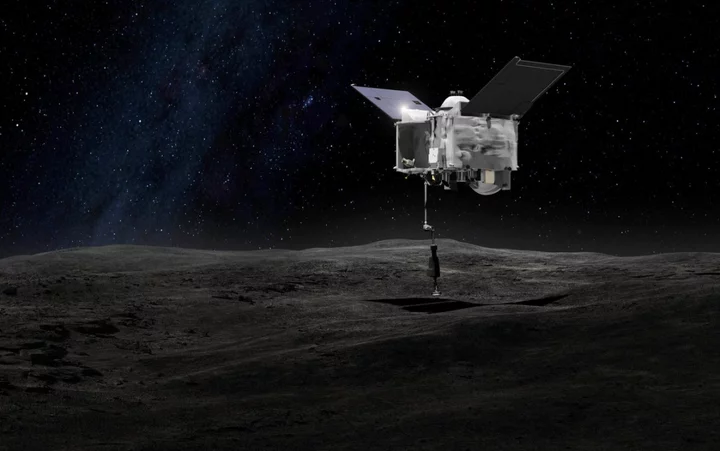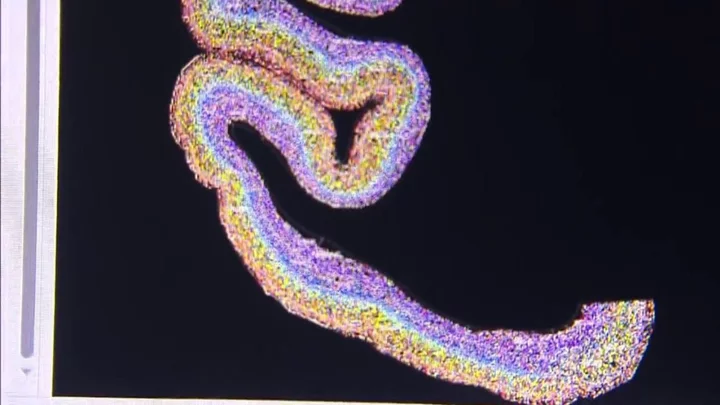
Exclusive-Russian hackers seek war crimes evidence, Ukraine cyber chief says
By Tom Balmforth and James Pearson KYIV/LONDON Russian spies are using hackers to target computer systems at law
2023-09-23 00:45

Pieces of Asteroid Bennu about to come to Earth as part of Nasa’s Osiris-Rex mission
Scientists are preparing to receive pieces of a distant asteroid, which will fall to Earth over the weekend and could reveal where we came from. On Sunday, a sample collected by a Nasa spacecraft that landed on Asteroid Bennu will float down into the Utah desert, where it will be gathered by scientists. They will then start work on analysing that material, in the hopes of understanding how planets form and what our solar system was like in its distant past. Nasa sent its Osiris-Rex spacecraft to Bennu in 2016, and it touched down on the distant asteroid in 2020, and scooped up a piece. Since then, it has been flying back towards Earth to drop the sample back home. The sample dropped out of Osiris-Rex will float down into the desert, helped by a parachute that should safely allow it to fall to the ground. The spacecraft itself will continue to fly, on its way to start a new mission to study another asteroid towards the end of the decade. It is the US space agency’s first mission to collect a sample from an asteroid, and is the largest asteroid sample ever returned to Earth. The capsule is estimated to hold around 250g of rocks and dust collected from the asteroid’s surface. Nasa will release a quarter of the sample to a group of more than 200 people from more than 35 globally distributed institutions, including a team of scientists from The University of Manchester, and the Natural History Museum. Asteroid Bennu is a 4.5-billion-year-old remnant of our early solar system and scientists believe it can help shed light on how planets formed and evolved. Experts say the carbon-rich, near-Earth asteroid serves as a time capsule from the earliest history of the solar system. It is anticipated that the sample will provide important clues that could help us to understand the origin of organics and water that may have led to life on Earth. Because the sample has been collected directly from the asteroid, there will be almost zero contamination. Meteorites that fall to Earth are quickly contaminated from the second they make contact with our atmosphere. This means Bennu can give us an unspoiled glimpse into the past. Ashley King, UKRI future leaders fellow, Natural History Museum, said: “Osiris-Rex spent over two years studying asteroid Bennu, finding evidence for organics and minerals chemically altered by water. “These are crucial ingredients for understanding the formation of planets like Earth, so we’re delighted to be among the first researchers to study samples returned from Bennu. ‘We think the Bennu samples might be similar in composition to the recent Winchcombe meteorite fall, but largely uncontaminated by the terrestrial environment and even more pristine.” Dr Sarah Crowther, research fellow in the Department of Earth and Environmental Sciences at The University of Manchester, said: “It is a real honour to be selected to be part of the Osiris-Rex Sample Analysis Team, working with some of the best scientists around the world. “We’re excited to receive samples in the coming weeks and months, and to begin analysing them and see what secrets asteroid Bennu holds. “A lot of our research focuses on meteorites, and we can learn a lot about the history of the solar system from them. “But meteorites get hot coming through Earth’s atmosphere and can sit on Earth for many years before they are found, so the local environment and weather can alter or even erase important information about their composition and history. “Sample return missions like Osiris-Rex are vitally important because the returned samples are pristine, we know exactly which asteroid they come from and can be certain that they are never exposed to the atmosphere so that important information is retained.” The spacecraft launched on September 8, 2016 and arrived at Bennu in December 2018. After mapping the asteroid for almost two years, it collected a sample from the surface on October 20, 2020. The capsule is expected to land at 3.55pm (BST). Astrophysicist Professor Boris Gansicke, Department of Physics, University of Warwick, said: “The asteroids in our solar system contain the raw building blocks from which the Earth was made, so working out their composition will tell us a lot of how our planet formed. “There are many open questions, for instance where did the water that we have on Earth come from? And where did the ingredients that made life possible to develop come from? “To answer those questions, i.e. measure the composition of an asteroid, you need to get your ‘hands’ on them (or in this case the arm of a space mission), and this is what Osiris-Rex achieved. “In a nutshell, it’s similar to sitting in front of a delicious dinner and wanting to have the list of ingredients.” Additional reporting by agencies Read More You need to update your Apple devices right now Amazon Prime Video will soon start running ads – unless you pay even more Amazon Prime Video will soon start running ads unless you pay a monthly fee You need to update your Apple devices right now Amazon Prime Video will soon start running ads – unless you pay even more Amazon Prime Video will soon start running ads unless you pay a monthly fee
2023-09-23 00:20

Apple releases emergency security fix as users advised to update iPhone, Watch, Mac and iPads straight away
Apple has released an urgent update for its iPhone, Mac and other products. The company said that the security update fixes three security flaws. As such, users have been urged to install the update as soon as possible, which can be done through the Settings app. All of the three bugs have already been exploited in the wild, Apple said, though it gave no information about how widely they have been used, or against whom. The three bugs meant that attackers would be able to make their way through different parts of the operating system to potentially steal information and take control of devices. It is just the latest in a run of major security issues that have forced Apple to push out updates this year. Earlier this month, Apple was required to fix a powerful security hole that researchers said had already been exploited by attackers using the “Pegasus” spying software. New updates are available for the iPhone, iPad, Mac and Apple Watch. They can be installed through their respective settings apps by clicking the “General” option and then software update, and the devices may prompt their owners to install them. The update came just three days after the release of iOS 17, Apple’s major update for the iPhone. And was released hours before the new iPhone 15 went on sale. As well as the security problems, the updates bring fix other bugs, Apple said. All three of the new bugs were found by Bill Marczak of The Citizen Lab at The University of Toronto’s Munk School and Maddie Stone of Google’s Threat Analysis Group, Apple said. Researchers at The Citizen Lab were also responsible for finding similar issues earlier this month. Read More iPhone 15 goes on sale – but you might struggle to actually get one iPhone 15: Apple workers strike in France ahead of biggest launch of the year Apple releases major update for iPhone, iPad, Apple TV and more
2023-09-23 00:19

Amazon Prime Video will soon start running ads unless you pay a monthly fee
Amazon Prime Video will include advertising during shows and movies starting early next year, joining other streaming services that have added different tiers of subscriptions. Members of Amazon Prime can pay $2.99 per month in the U.S. to keep their service ad-free, the company said Friday. Amazon said limited advertisements will be aired during shows and movies starting early next year so that it can “continue investing in compelling content and keep increasing that investment over a long period of time.” Ads in Prime Video content will start in the U.S., U.K., Germany, and Canada in early 2024, followed by France, Italy, Spain, Mexico, and Australia later in the year.
2023-09-22 23:27

Scientists discover strange 'mathematical pattern' in the human body
The human body is a marvel of science and researchers have discovered a strange reoccurring mathematical pattern within its cells. Our bodies are made up of a massive variety of individual cells with countless different functions, from neurons in our nervous system to the oxygen carriers that all work in harmony to keep us alive. Experts from scientific research institutions in Germany, Canada, Spain, and the US have worked together on a study to determine just how many cells of each type there are in the human body and the results are staggering. They found that most adult males possess around 36 trillion cells, while adult females have in the region of 28 trillion cells. For a 10-year-old child, they have around 17 trillion. Interestingly though, scientists discovered that, regardless of the total number of cells, if they are grouped according to their function, the proportions for each individual remain the same. The researchers explained in their findings: “These patterns are suggestive of a whole-organism trade-off between cell size and count and imply the existence of cell-size homeostasis across cell types.” Scientists believe there is a natural balancing act at play between different cell types with new cells being produced to maintain the balance. The body produces fewer larger cells (such as muscle fibres) and more smaller cells (like blood cells). It is hoped that future studies will be able to uncover exactly how this happens and how bodies seem to naturally regulate cells. They explained that all cells are perfectly sized for their roles and any deviation from their scale can indicate the presence of disease. Experts have made their data, analysis and results public in the hopes that future studies into biology will be able to utilise their research. Sign up to our free Indy100 weekly newsletter Have your say in our news democracy. Click the upvote icon at the top of the page to help raise this article through the indy100 rankings.
2023-09-22 23:21

iPhone 15 and Pro: Apple opens sales for new line-up – but new orders might not be delivered for months
The iPhone 15 has gone on sale – though customers might struggle to actually get hold of one today. The four new versions of the iPhone as well as updated Apple Watches were revealed at an event in California last week, and opened for pre-orders on Friday, 15 September. A week later, those pre-orders have arrived in the hands of the first customers and the iPhones are now available in stores. In recent years, Apple has discouraged the long queues that used to greet the launch of the iPhone, instead encouraging people to pre-order online even if they intend to eventually pick them up in store. The new launch was nonetheless met with lines at large Apple Stores. Some versions of the phones are already showing long waiting periods until they are delivered, however. Most models of the iPhone 15 Pro Max are not expected to be delivered until the end of October – and some even later than that. Numerous rumours had suggested that Apple would increase the price of this year’s models. But in fact the cost remained the same – and was reduced in the UK, in a surprise move. The iPhone 15 line-up comes in four different options: the base iPhone 15, a Plus model, and the iPhone 15 Pro and Pro Max. The iPhone 15 gets many of the upgrades that came to the Pro phones last year – an updated chip, better cameras and the “Dynamic Island” at the top of the screen – while this year’s Pro models feature a new titanium design, camera improvements and a much faster processor. It also released a new version of the Apple Watch, the Series 9, which brings an improved display and a “Double Tap” feature that lets people control the device just by using their hands. The Apple Watch Ultra was also updated to get that feature.
2023-09-22 22:23

Intel hit with $400 million EU antitrust fine in decades-old case
By Foo Yun Chee and Bart H. Meijer BRUSSELS (Reuters) -Intel was fined 376 million euros ($400 million) on Friday
2023-09-22 19:51

Amazon to roll out ads on Prime Video in 2024
(Reuters) -Amazon Prime Video users will see ads on shows and movies from early next year unless they subscribe for
2023-09-22 18:27

EU set to demand e-fuel cars have no climate impact -document
By Kate Abnett BRUSSELS (Reuters) -The European Union is set to demand that cars running on e-fuels must be 100%
2023-09-22 17:53

Scientists baffled by discovery of completely mummified man just 16 days after he was last seen alive
Warning: This article does contain images some readers might find disturbing. Investigators have been left puzzled after finding a man’s body in a stage of “complete mummification” just 16 days after he was last seen alive. The man was found alongside a railway line in Bulgaria on 3 September. Identity checks later found he was 34 when he died, with a history of alcoholism, and was last seen alive on 16 August. However, his insides had been reduced to “structureless masses”, and case workers have been unable to explain how the body reached such an advanced state of mummification so quickly. A report published in Cureus journal shows a full set of pictures of the corpse – linked at the foot of this article. Trigger warning, they’re pretty gruesome. It has got scientists fascinated though. The report’s authors reveal that the “skin surface showed coloration ranging from light to dark brown, and it was hard and leathery.” “The internal examination of the body showed that the internal organs in the cranial, thoracic, and abdominal cavities had decayed into dried, brownish-black masses,” they write. Researchers stressed that natural mummification “usually takes several weeks to 6-12 months”, and that such a fast transformation would only normally happen in extreme heat. The temperature in Sofia has ranged from 16 to 33 degrees Celsius in the time period, which scientists said is not hot enough. The authors speculated that passing trains could have created a windy environment that could have contributed to drying out the body and causing bodily fluids to evaporate. They said it almost certainly wasn’t the weather in Sofia that caused the bizarrely fast mummification process. As of yet, it remains a mystery. Here’s the journal article. Sign up to our free Indy100 weekly newsletter Have your say in our news democracy. Click the upvote icon at the top of the page to help raise this article through the indy100 rankings.
2023-09-22 17:17

Another top Silicon Valley investor is splitting off its China business as pressure mounts
GGV Capital, a prominent Silicon Valley venture capital firm, has become the latest big investor to break up its US and China operations into separate companies as tensions between the two countries over tech and geopolitics continue to rise.
2023-09-22 16:54

Huawei’s New Chip Powering Sales Surge Shown to Have 5G Support
Huawei Technologies Co.’s Kirin 9000s processor supports 5G wireless speeds, TechInsights said, dispelling some of the mystery around
2023-09-22 14:21
